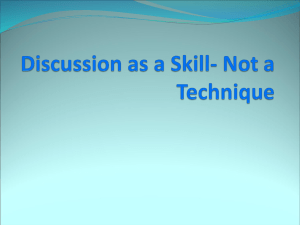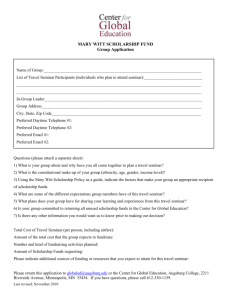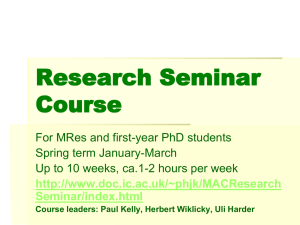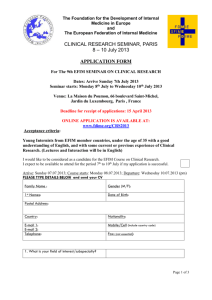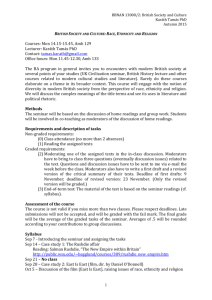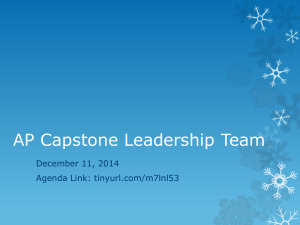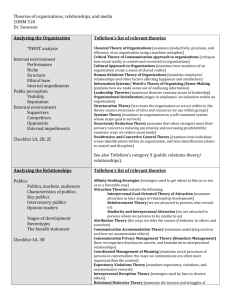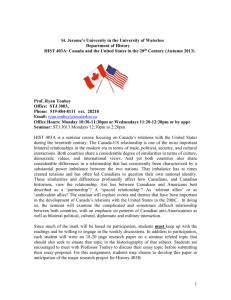June 6, 2012 First-Year Seminar Course Descriptions Fall Term
advertisement
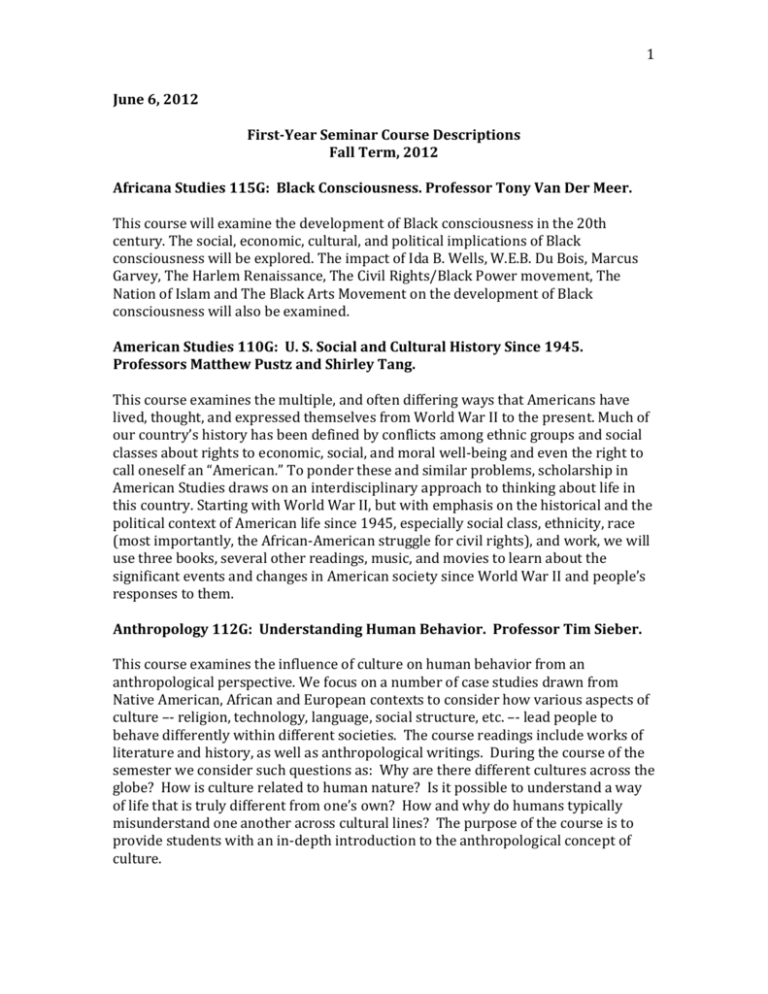
1 June 6, 2012 First-Year Seminar Course Descriptions Fall Term, 2012 Africana Studies 115G: Black Consciousness. Professor Tony Van Der Meer. This course will examine the development of Black consciousness in the 20th century. The social, economic, cultural, and political implications of Black consciousness will be explored. The impact of Ida B. Wells, W.E.B. Du Bois, Marcus Garvey, The Harlem Renaissance, The Civil Rights/Black Power movement, The Nation of Islam and The Black Arts Movement on the development of Black consciousness will also be examined. American Studies 110G: U. S. Social and Cultural History Since 1945. Professors Matthew Pustz and Shirley Tang. This course examines the multiple, and often differing ways that Americans have lived, thought, and expressed themselves from World War II to the present. Much of our country’s history has been defined by conflicts among ethnic groups and social classes about rights to economic, social, and moral well-being and even the right to call oneself an “American.” To ponder these and similar problems, scholarship in American Studies draws on an interdisciplinary approach to thinking about life in this country. Starting with World War II, but with emphasis on the historical and the political context of American life since 1945, especially social class, ethnicity, race (most importantly, the African-American struggle for civil rights), and work, we will use three books, several other readings, music, and movies to learn about the significant events and changes in American society since World War II and people’s responses to them. Anthropology 112G: Understanding Human Behavior. Professor Tim Sieber. This course examines the influence of culture on human behavior from an anthropological perspective. We focus on a number of case studies drawn from Native American, African and European contexts to consider how various aspects of culture –- religion, technology, language, social structure, etc. –- lead people to behave differently within different societies. The course readings include works of literature and history, as well as anthropological writings. During the course of the semester we consider such questions as: Why are there different cultures across the globe? How is culture related to human nature? Is it possible to understand a way of life that is truly different from one’s own? How and why do humans typically misunderstand one another across cultural lines? The purpose of the course is to provide students with an in-depth introduction to the anthropological concept of culture. 2 Anthropology 113G: Food and Society. Professor Amy Todd. This course revolves around food - a topic that is important to all of us. Throughout the semester we will explore how food is related to culture. Discussion topics include the origins of agriculture, food taboos, the social organization of eating, festivals, and feasting. The focus of this 4 hour/4 credit seminar is food. The readings are structured around different aspects of this topic that will allow us to closely examine how food, society, and culture are interconnected. As food is something that everyone can relate to in one way or another, I anticipate the discussions throughout the semester being quite lively and thought provoking. These class discussions will be facilitated by writing assignments designed to help you focus your thoughts and through inclass group projects. In our study of food we will also learn aspects of critical thinking, careful reading, as well as how to do library and web-based research. Longer writing assignments and oral presentations will allow you to apply these skills to specific questions and data sets. Economics 110G: Economic Ideas. Professors Jonathan Millman and Ellen Frank. This first-year seminar course presents basic economic concepts and tools of analysis in the context of current economic issues. Controversies over the distribution of income, the role of markets, pollution, or globalization are often addressed, although topics vary with the instructor. Students may receive credit for only one of ECON 100, ECON 110G or ECON 112G. English 181G, Literature and the Visual Arts. Professor Virginia Karlis. In this course, we will read and discuss short stories, poetry, plays and a novel, with a theme of a journey examined in the selected works. We will pay close attention to the concept of “journey,” and how it relates to characters, social constructs and plot, as well as the consequences of choice and circumstance. To complement the selected literature, we will also study visual interpretations such as art works, movies, architecture- whatever can be identified as a visual adaptation or connection. In working with various versions and interpretations of the selected work, we will identify the differences and similarities. We will familiarize ourselves with literary devices and terminology such as genre, narrative voice and diction, and understand how our awareness of those elements contributes to our appreciation and interpretation of what we read. You will learn to talk and write about literature and be able to articulate your opinions of why a piece of writing or its visual interpretation "works" for you and why it does not. Hopefully, our study of the concept of “journey” will broaden its scope, and will apply both to the writers we study, and to you, as readers and writers on your own journey. 3 English 183G: Literature and Society. Professor Candace Rowe. BOSTON: Beantown, The Hub of the Universe, The Athens of America, Red Sox Nation, Celtic Pride. In this course, we will read and discuss various literary works about Boston, and by Bostonians. What makes this part of the world so uniquely independent yet wonderfully diverse? In 1773, history was made when Bostonians had their infamous Tea Party--boarding a British tea ship, and tossing the tea into Boston Harbor in protest of unfair taxation. Let’s see what else we can find about the spirit of our city and its people. To complement the selected literature, we will also study visual interpretations such as art works, movies, architecture- whatever can be identified as a visual adaptation or connection. We will familiarize ourselves with literary devices and terminology such as genre, narrative voice and diction, and understand how our awareness of those elements contributes to our appreciation and interpretation of what we read. You will learn to talk and write about literature and be able to articulate your opinions of why a piece of writing or its visual interpretation "works" for you and why it does not. Hopefully, our study of “Boston” writings will lead to you becoming one as well! History 190G: Modes of Inquiry--Witchcraft in Medieval and Early Modern Europe. Professor Maryann Brink. Witches and witchcraft are phenomena found throughout history and throughout the world. This intensive introductory seminar revolves around the various ways the idea of witches, people who identified themselves or were identified as witches, and their practices interacted with European society at large and helped shape society, religion, law and culture from about 700 CE until 1700 CE. Inter-D 100G: Special Topics. Asian-American Visual Culture—and Cool! Professor Shirley Tang This first year seminar explores critical themes and issues in Asian American art history and visual culture studies, while adding visual literacy to a list of core general education skills and competencies to enhance students’ learning and research. Focusing on important artists and key moments in Asian American history, particularly in the post-1965 period, the course addresses the relationships among Asian American visual cultures, community cultural development, diaspora and transnationalism. Music 105G: Music of the World. Professor Frederick Stubbs. This course examines the power and function of music in pan-human context. Drawing on a wide variety of sounds and texts, students investigate the relationship between music and intellect, spirit, community, and environment. Special attention is given to how terms, concepts and values from various world musics illuminate and amplify our essential understanding of this human phenomenon. Please note: 4 Students may receive credit either for this course or for MUSIC C110 (World Music), but not for both. Philosophy 109G: Moral Debate in Society. Professor Roma Farion This course will study some contemporary problems of social ethics, particularly abortion; the death penalty; pornography, hate speech, and censorship; and world hunger and poverty. We will study varied positions on these issues, and the justifications that have been offered to support them. The course will develop the ability of each student to clearly articulate her position in each of these controversies, and to defend it persuasively, both in speaking, and particularly in writing. Philosophy 110G: Equality and Justice. Professor Robert Rosenfeld This course examines several forms of inequality: oppression and exclusion based on race and gender; the differences between born and unborn humans, and between humans and non-human animals; and inequality in access to social goods such as health care. Participants examine issues of moral inclusion, justice and rights that underlie these inequalities. Philosophy 130G: Privacy. Professor David Flesche. This course examines several of the current threats to privacy in the computer age related to drug testing, the assembling of personal information dossiers, genetic screening, privacy on the internet, medical records, and workplace concerns. It makes use of philosophical legal, and privacy rights. This course may count toward the major in philosophy. Political Science 113G: Political Identity. Professor Elizabeth Bussiere. This course addresses the question of how and to what ends people choose a political identity, what it means to them, and what kinds of political commitments follow from it. In addition to issues of transnational and national identity, the course examines how such identities as race, gender, class, sexual orientation, and disability shape our sense of selves and others, and the communities to which we feel attachment." Drawing on readings from across the disciplines, from fiction and the press, it examines political identity and some of the conflicts it can produce. Seminar 114G: Investigations Across the Curriculum--Reality and the Americas. Professor Meesh McCarthy. This course examines how reality and fantasy are understood and constructed by, across, and in the Americas. We will use materials drawn from across the curriculum (e.g., from history, psychology, and media and communication studies) to develop our definitions of reality, fact, truth, fiction, fantasy, myth, virtual space, 5 and reality-television. The course begins by relying on Howard Zinn's A People's History of the United States, which allows us to explore how we view the past and reality. As students develop their arguments about how categories such as reality and fantasy differ and overlap, we will ask questions such as: How do definitions of reality/fantasy change as we shift from the humanities to the physical/social sciences? Is there a distinct or a blurred boundary between reality and non-reality (during, for example, online social networking)? As we explore relationships between reality and the Americas, students will work on the seven capabilities that all First Year Seminar courses introduce to their students. Like other First Year Seminars, this is a four-credit course that meets four hours per week. You will be expected to think, rethink, and then to challenge or change your premises and think again. You will be expected to focus and to help your classmates to do so in classroom, computer lab, and library settings. At the end of the course, students will complete an independent project that connects the course themes to their own interests. Past projects have included student-imagined and student-developed portions of websites, mass mailers, video games, newspapers, and academic journals. Seminar 120G: Mind-Body Connections. Professor Bryan Williams. How do the body and mind interact? Through observations of ourselves as recorded in journals, and through the course’s readings and library research, we will investigate possible answers. Along the way we will read about the growth of neuronal connections in the adult human brain and about the interaction between the emotions and daily life. For assignments there will be essays and frequent presentations. Once or more each week, there will also be required meditation and/or exercise, especially to foster sensory awareness. The exercises will be adaptable to short- or long-term physical limitations. Seminar 125G: Defining Freedom. Professor Polly Welsh. By examining the issues of race, class, and gender, participants look at what freedom has meant to different people in the United States. They are also asked to reflect on and write about their personal definitions of freedom and to broaden and deepen the understanding they bring to their own historical situations. Seminar 126G: Aging and Wisdom. Professor Theodora Chocos. We will examine varied historical, cross-cultural, and literary views on aging and wisdom. Through a wide range of texts and genres, a visit to a nursing home, and an interview with an octogenarian, we will take an in-depth look at the way individuals, societies and families deal with and view the elderly, death, and dying. We will analyze the causes and effects of these attitudes and how they relate to social and political expectations, policies, and changes. 6 Sociology 110G: Insiders/Outsiders. Professors Matthew Gregory and Mohammad Tamdgidi. What often makes it possible to justify and practice oppression is the division of groups of people into outsiders/insiders based on their gender, “race”/ethnicity, class, age, sexuality, religion, nationality, belief, ability, or others. Such “Us” vs. “Them” dualisms give oppressors the justification to organize social (economic, cultural, political) structures and interactions in such a way that the free development of their own creative powers comes at the expense of preventing others from developing the same in themselves. Central to what makes insider/outsider mentality and divisions possible is the deeper dualism of self vs. society. The central purpose of this course is to go beyond such an insider/outsider mentality and lifestyle by developing our sociological imaginations, a way of looking at the world and ourselves that helps us understand how our personal troubles and larger public issues have shaped and influenced one another, and can in turn shape and influence one another in non-oppressive ways. Using a variety of readings augmented by selected films, in this course we will explore how sociology can help us understand how society works itself out in our everyday lives, and how we can become better persons and help create better societies, thereby pursuing what a liberal arts education promises to do: to help individuals freely develop their creative powers and seek the same for others in the world. Student assignments will consist of engaged attendance and participation in discussions, shared reports and presentations, and a term paper developed in multiple drafts, cultivating students' critical sociological imaginations by exploring the link between their personal troubles and ever globalizing public issues. Sociology 120G: Sociology of Popular Culture. Professors Matthew Gregory and Ashleigh Shelton. What is popular culture? How do mass media and popular culture help us to make sense of our world, identities, and relationships? Do we organize our lives around media or do media shape our lives? Do media technologies make us happier or better citizens in a democratic society? This course will address such questions by applying various theoretical lenses to artifacts and visual messages in media and popular culture, with a primary emphasis on developing a critical awareness of contemporary mass media (radio, film, photography, music, television, fashion, video games, the internet) and their impact on culture. You will examine your own conceptions and consumption of media through (1) readings and group tasks that engage and challenge your perspective on our cultural landscape, (2) a service-learning project that integrates the local community with your understanding of course 7 material, and (3) writing assignments that allow you to apply the theories and concepts you learn to your own analysis of popular culture. Access to a camera is required.

